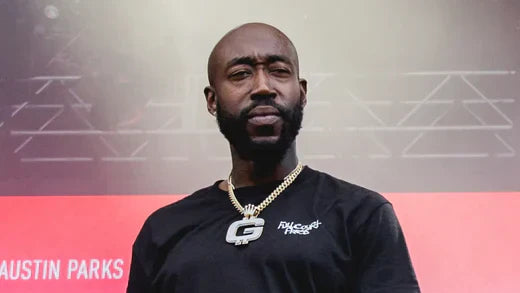
You Only Die 1nce Album Review: Freddie Gibbs Brings Fire, Even If the Devil Interrupts
Let me start by addressing the obvious: this review is late. Not “fashionably late,” but “you-showed-up-after-the-party-was-cleaned-up” late. Freddie Gibbs dropped You Only Die 1nce on Halloween 2024, and here I am in January 2025 writing about it. Why the delay? Well, I didn’t have a website back then. Now that Black Ronin Sounds is live, let’s call this a “time capsule critique,” shall we?
The Album’s Core: Bars and Beats
Freddie Gibbs is an artist who thrives on reinvention while staying true to his roots. With You Only Die 1nce, he delivers a sharp, lyrically dense project that reminds us why he’s one of the most respected rappers in the game. From the opening track, Gibbs weaves tales of his struggles, victories, and regrets with a flow so precise you’d think he’d spent years refining every syllable. This album feels like a direct line into Gibbs’ mind—a raw, unfiltered reflection on fame, the music industry, and mortality.
The production leans minimalist, allowing Gibbs' voice to take center stage. The beats are moody, with a mix of jazz-infused loops, hard-hitting drum patterns, and atmospheric melodies. Tracks like “Wolverine” and “Brick Fees” stand out, showcasing Gibbs' ability to flow effortlessly over eerie, bass-heavy instrumentals. “Wolverine” feels like a sonic embodiment of survival, with Gibbs tearing through the track with razor-sharp bars, while “Brick Fees” has an infectious bounce that contrasts its grim storytelling. While some might miss the maximalist, star-studded soundscapes of $oul $old $eparately, there’s something refreshing about the stripped-down nature of this project—it’s gritty and intimate, much like Gibbs himself.
About Those Skits...
Here’s where things get dicey. While You Only Die 1nce is cohesive, the skits scattered throughout the album slightly disrupt the flow. Don’t get me wrong—Slink Johnson as the devil is hilarious, and thematically, it ties into the album’s exploration of sin, redemption, and life’s fleeting nature. But every time I was fully immersed in Gibbs’ bars, one of these skits would pop up just to remind me that the devil is still lurking.
Imagine you’re watching a Tarantino movie, fully engrossed in the dialogue, and suddenly there’s a commercial for Satan’s car insurance. That’s the vibe I got. They’re entertaining, sure, but did we need that many of them? Probably not. At least make all of the skits separate from the actual songs so I can get my skip on.
Where’s “It’s Your Anniversary”?
Alright, I have to address the elephant in the room—or rather, the song that’s not in the room. Freddie, why did you have to let “It’s Your Anniversary” go? Apparently, the sample didn’t clear, so the track got pulled from the final album, which is a tragedy because it was one of my favorite songs. Such a great flip on the iconic Tony Toni Tone song "Anniversary." One of these days I'm going to learn to stop streaming albums and start buying them again as the song was removed from streaming services about a month after the album dropped. I get it, though—labels and lawyers don’t play around with samples these days. But come on, couldn’t we have gotten a remix or something? Now I’m stuck scouring YouTube and SoundCloud like a digital archaeologist just to hear it again (it's not that hard to find but still, it's principle). Freddie, you owe us a deluxe edition with this track reinstated—uncleared sample and all.
The Highlights: Freddie’s Pen Game
One of the strongest aspects of this album is Gibbs’ ability to switch between brash confidence and vulnerable introspection. On tracks like “Rabbit Island,” he reflects on his struggles and the barriers he’s had to break through, delivering raw, heartfelt bars over a soulful beat that gives plenty of room for his lyrics to take certain stage. In contrast, “Steel Doors” sees him in full flex mode, effortlessly spitting slick punchlines and showcasing his unmatched flow on a beat that’s both infectious and cinematic.
Gibbs has always had a knack for storytelling, and this album is no different. Whether he’s reminiscing about his early days in Gary or pondering the fleeting nature of success, there’s a raw honesty in his delivery that makes every line hit harder. And while he might not be reinventing the wheel, he’s polishing it to a near-blinding shine.
Late But Worth It
So here we are—months after the album’s release—and I’m finally giving You Only Die 1nce the attention it deserves. Sure, I missed the initial hype wave, but Gibbs’ music doesn’t need a timestamp. His work exists in a timeless space where great rap lives, regardless of the release date.
Is You Only Die 1nce Freddie’s best album? Maybe not. It doesn’t quite reach the grandeur of $oul $old $eparately, but it doesn’t need to. This project is more personal, more introspective, and more stripped-down. The skits might have been a slight misstep, but they don’t overshadow the album’s brilliance.
At its core, this album is a reminder of why Freddie Gibbs remains one of hip-hop’s elite—his ability to craft compelling narratives, deliver jaw-dropping bars, and keep us hooked, even when the devil himself pops in for a cameo. By the way Freddie, if by some cosmic twist of fate, you’re reading this and on the off chance you’re ever looking for some heat for your next project, holla at yo boy! Black Ronin Sounds stays cooking up beats. I promise no distracting skits, just vibes. (Okay, maybe one skit, but only if it’s absolutely necessary and hilarious.)
So, here’s to You Only Die 1nce: a Halloween treat worth savoring long after the candy’s gone stale. If this review is late, well…better late than never, right? A solid 8/10 here at Black Ronin Sounds!
